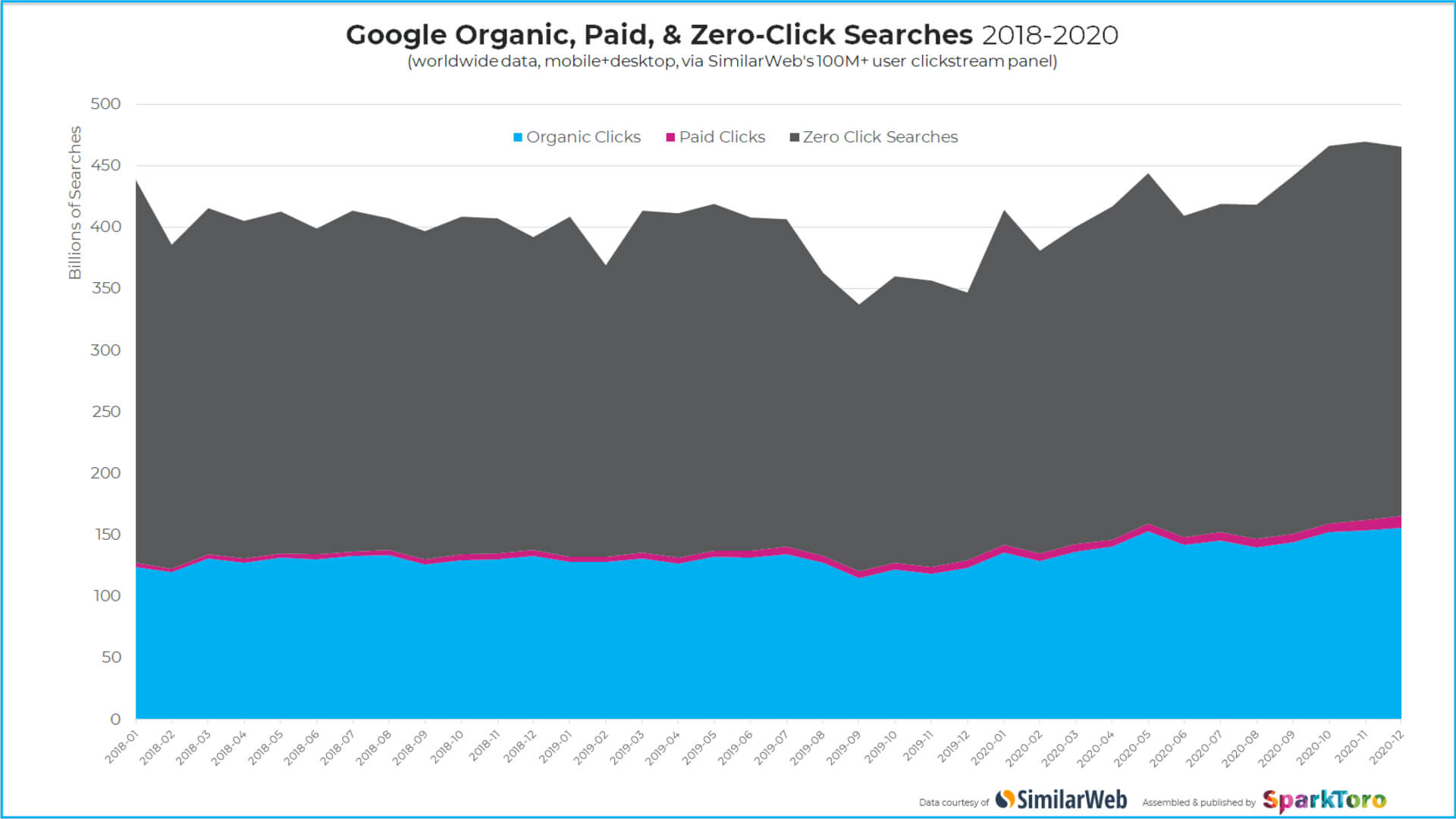Zero-click Google searches grew to roughly 65 percent
Efforts to restrict Google haven’t had much of an impact. Furthermore, while the epidemic may have increased total search volume. Zero-click searches may increase even more as individuals become more mobile.
According to a SimilarWeb analysis provided by Rand Fishkin, founder of SparkToro, approximately 65 percent of Google searches concluded without a click to another web page between January and December 2020. Up from 50 percent in June 2019.

46.5 percent of searches on the desktop were zero-click, compared to 77.2 percent on mobile.
Methodology caveats.
This most recent result and the 50% figure from 2019 were not derived from the same data source and used different search algorithms. SimilarWeb’s new data incorporates both mobile and desktop devices. Including iOS devices, and covers a pool of 5.1 trillion global Google searches.
Only one billion web browser searches from domestic desktop and Android devices were included in the data Fishkin utilized in 2019. Which came from the now-defunct clickstream data vendor Jumpshot. “However, it is likely that if the previous panel were still available. It would indicate a similar trend of increased Google click cannibalization,” Fishkin said in his analysis.
More searches, possibly due to COVID.
Following a dip in 2019, overall search volume increased in 2020, possibly as people adjusted to life during the coronavirus pandemic.

Because zero-click searches are more common on mobile devices than on desktop, the proportion of overall zero-click searches could rise as COVID cases decline and people become more mobile.
Zero-click searches and market dominance.
Users’ inquiries may be resolved right on the results page with zero-click searches. Google can extract profit from zero-click searches by presenting adverts or its own items, whereas other sites may not. This is especially problematic because Google gets a lot of the content on its results pages from publishers, and as the percentage of zero-click searches rises, publishers may be losing out on traffic.
While zero-click searches have grown in popularity. Google’s dominance in search and digital marketing remains at the center of legal fights and debates around the world. In December, ten state attorneys general filed a lawsuit alleging that Google and Facebook conspired to limit header bidding.
Abroad, Google threatened to shut down its search engine in Australia if the country implemented a News Media Bargaining Code which may force the corporation into binding arbitration agreements with publishers.
In September 2019, SEOs said that the outcomes of congressional and DOJ investigations into Google were the least likely to have a big impact on the sector over the coming three years —that point of view looks increasingly justified. More recently, new information regarding why the FTC didn’t sue the company in 2013 was made public, reigniting conversations about regulating the market leader.
Nonetheless, recent attempts by regulators in other countries appear to have failed: The Android search option screen. Which was implemented as part of Google’s effort. To comply with the European Commission’s antitrust judgment in July 2018. Has had almost no impact on the company’s market share. And, as more publishers agree to Google’s News Showcase. The company’s own idea for compensating news media organizations. The momentum of the Australian News Media Bargaining Code appears to have stalled.
Why we care.
The impact of zero-click searches is not fairly dispersed across industries. Businesses in Google’s competitors’ industry. Such online travel agencies or review platforms may lose a larger share of traffic than other businesses. The overall amount of searches has increased, which might suggest additional chances for businesses that aren’t directly competing with Google.
Adding schema markup and optimizing for highlighted snippets could help your company raise awareness. “Rich content appearing in Google’s results may be harder to quantify than website traffic. Like billboard ads or press mentions. But it’s still exposing your brand name to an audience, creating familiarity, and sharing information,” says the author. “In my perspective, the businesses who find methods to gain from that type of SERP exposure, even without a click, will be the ones that succeed at this new form of on-SERP SEO.” Fishkin previously told Search Engine Land.
UPDATE:
In a blog post published Wednesday, Google replied to the study’s discussions. Google highlighted out several ways individuals use search to find what they’re searching for that don’t necessarily lead to a visit to another online page in the post:
Rephrasing queries in order to find more relevant results.
Looking up quick information.
Obtaining information about local businesses.
Getting to an app directly from the results.
The business also mentioned that the mobile search results reveal an average of 26 links to websites per page. According to the Search Engine Roundtable’s discussion of the study’s methodology (as opposed to the traditional 10 blue links).
The impact of zero-click searches differs by industry, as we’ve noted in our own coverage. While a statistic that claims to reflect all searches may be beneficial for tracking trends in user behaviour and/or Google interface changes, businesses should focus on the specific inquiries that matter to them.
The post Zero-click Google searches grew to roughly 65 percent appeared first on Soft Trending.
from Soft Trending https://ift.tt/3Ad7t4Y
via softtrending
Comments
Post a Comment